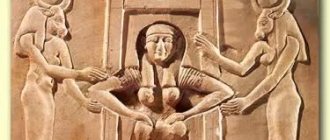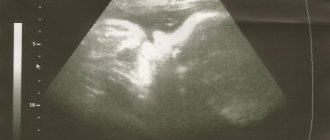Health
Many women may say: what can men know about pain during childbirth?
Of course, they will never know, considering that some of them begin to writhe in agony after lightly hitting their little finger on a chair leg.
However, there is pain that can be much more intense than the pain during childbirth, according to women who have gone through childbirth.
.
It is worth noting that pain during childbirth is difficult to measure, given that each woman experiences it differently depending on many factors.
Here are the experiences shared by people on parenting forums, and also the results of several scientific studies that claim that there is pain greater than that which you experience when giving birth to a new person.
Stones in the kidneys
According to experts, the pain from kidney stones can be as severe as the pain of childbirth.
One of the women who gave birth and had kidney stones swore that childbirth was easier than kidney stones. However, others claim that the pain is about the same
, and if you want to explain it to a man, it is closest to what women experience during childbirth.
«The first time I had kidney stones, I didn't know what they were, which added a sense of real terror to the physical agony. It felt as if someone had taken a red-hot poker and slid it along the sides, periodically tapping it with a hammer for good measure.
.
The pain was so severe that I not only went blind, but also became deaf and lost the ability to perceive space and time. I simply found a position in which I thought I would die more slowly, namely on the floor of the emergency room. “
“ I howled like a wounded dog, clinging to the carpet with my fingers and toes. I was drooling and couldn't speak clearly. They gave me morphine and it relieved the pain a little so I could explain what was wrong while I was screaming. Then they injected me with something else and that's all I remember
«.
Physiology of sexual intercourse in women
Why nature invented orgasm, sexologists still cannot answer for sure. However, they were able to determine the main phases of sexual intercourse.
READ How to find a woman's G-spot and deliver unearthly arousal
Phase 1: desire
Here spiritual intimacy plays the main role. Numerous external factors are added - music, atmosphere, smell, associations. The latter may seem illogical. From a female perspective, this phase is especially important for further sexual sensations.
Phase 2: excitement
A physiological process in which the brain and other organs operate. The hypothalamus sends signals to the adrenal glands and ovaries to produce testosterone. The nipples and clitoris swell, and the labia enlarge due to the flow of blood.
Phase 3: plateau
Characterized by strong, prolonged arousal. Brain activity decreases, Bartholin glands secrete internal secretion into the vagina. The skin, clitoris and nipples become the most sensitive.
Phase 4: orgasm
The shortest phase. The woman experiences multiple orgasms, the maximum number has not been identified.
Phase 5: rest
Due to the release of prolactin and oxytocin, the girl feels pleasure, pleasant fatigue and relaxation.
READ How to make a girl feel good in sex: intimate secrets
A clear division of sexual intercourse into phases characterizes successful sex, when the partners are friendly to each other, experienced and committed to intimacy.
Toothache
Toothache is also often compared to the pain of childbirth. For example, there were cases when pain relief did not work and a person could fully feel how his nerve was being removed.
«I'm good at a lot of things, but I would ALWAYS choose childbirth over toothache. I didn't have the easiest birth though.
«.
The fact that toothache is often aching and can last for a very long time
, became the main reason why she was considered one of the strongest.
What contractions feel like at the very beginning
Before starting to describe contractions, every mother should know what they are.
Contractions are a kind of contraction of the muscles of the uterus with its further relaxation. At the very beginning of labor, contractions begin to intensify, which allows the baby to move along the birth canal.
Every woman's body is unique. Therefore, all sensations during contractions will vary. Also, feelings during the birth process, of which contractions are a component, are different for each organism. But what unites them is a wonderful result - the birth of a new person.
The contraction begins at the upper point of the uterus and gradually spreads throughout all its muscles. In general, such sensations resemble tension in muscle fibers, which gradually begin to weaken. At the very beginning, the onset of contractions is rarely painful. Rather, to a greater extent, for a woman in labor it is a feeling of discomfort.
In some pregnant women, the onset of contractions is accompanied by a feeling of pain in the lumbar region. Most often, this is caused by the fact that the child turns his face towards the spine and moves the back of his head.
For a woman giving birth for the first time, such sensations are unfamiliar. But pregnant women who have already walked this path will not confuse this condition with anything. As already noted, each woman experiences contractions differently. Some feel muscle relaxation, some experience lower back pain, while others experience all the symptoms and sensations of menstruation.
During this period, contractions do not cause the woman much anxiety, so it is better to relax and try to rest before the upcoming birth. For the quick and correct birth of a child, the mother will need to devote maximum effort. After all, the speed of progress largely depends on the woman herself.
But what unites them all is regularity. The first contractions can occur at intervals of half an hour or more. Gradually the gap between them will decrease.
We can assume that true contractions have begun if the following is observed:
- Regularity of occurrence;
- Constantly decreasing the interval between each contraction;
- There is a gradual increase in pain.
Before giving birth, what sensations does a pregnant woman experience and what happens the day before giving birth?
Carrying a child is a long and emotionally intense process. Towards the end of the term, a pregnant woman may experience a variety of sensations. The main moment is ahead - the day of birth. It is usually preceded by physiological and psychological changes. The body gains strength before childbirth and itself tells you that everything will happen soon.
Psychological state of a woman
Usually, before giving birth, emotional sensations are inhibited, the woman becomes distracted, drowsy and forgetful. Frequent mood swings: sometimes I want to cry, sometimes I want to laugh with happiness. Accumulated fatigue and long waits lead to a desire to hasten the onset of labor.
Before giving birth, many expectant mothers are overcome by a strong desire to arrange their home, clean everything until it shines and wash it, and rearrange the furniture. This is explained by the subconscious desire to bring a newborn baby into a clean and comfortable home.
And also keep yourself busy with some work and drive away fears and bad thoughts. After all, the course of the birth process itself largely depends on the emotional state of a woman.
Fear is known to increase muscle spasms and make it harder for the cervix to dilate.
Physiological state
1-2 weeks before birth, the abdomen swells. A woman can see this herself by looking at herself in the mirror. The fetus descends lower to the pubic part, the pressure on the stomach and diaphragm becomes less.
It becomes easier to breathe before giving birth. But now there may be discomfort in the pubic area and numbness in the bend of the hip and leg.
A woman's gait may change a week before giving birth - it will become more clumsy.
It becomes too cramped for a grown child. His activity decreases. Since his head is close to the cervix, he can only move his arms and legs. Sometimes the day of birth begins immediately after the moment the abdomen subsides. Read more about when and how the belly drops before childbirth →
What is labor
Labor is the final stage of pregnancy, which, in turn, is divided into three main stages. These are prenatal activities, the birth of a child and the birth of an afterbirth. All these phases require strength, patience and concentration from a woman. Since childbirth for all representatives of the fair sex begins at a strictly individual time, in the last stages of pregnancy you need to learn to listen carefully to your body, be able to notice the smallest changes in your condition, so that if necessary, contact a doctor in time. After all, the life of the unborn child depends on these seemingly insignificant details.
Pregnancy and childbirth
In order to better understand the process of childbirth, it is definitely worth studying general information about pregnancy. Let's start with the fact that it ideally lasts 40 obstetric weeks. At this time, the fetus grows and develops in the mother's womb. By the end of the term, he is already fully formed and ready to be born. If a baby is born at 38-40 weeks, it is considered full-term. Such children are healthier and usually do not lag behind their peers in development. Otherwise, when birth occurs before 38 weeks, the baby will be premature. In the future, his health is closely monitored by doctors at the children's clinic, where he is registered. Therefore, to avoid such problems, every woman should try to carry her child to term as long as possible, then the birth will be successful.
What sensations does a woman experience during childbirth?
The most pressing question for many expectant young mothers is: what feelings should a woman experience on the day of birth?
Childbirth is divided into several periods. They begin with contractions, the interval between which gradually decreases. As this interval decreases, closer to the pushing itself, when the cervix opens more and more, the woman may feel a strong urge to go to the toilet “for a long time.”
There may be some bleeding during labor, but this is normal. If the bleeding is severe, this may indicate some complications and the doctor should immediately take appropriate measures. By the end of the first stage of labor, the cervix dilates to its maximum, and the woman experiences a feeling of strong pressure in the perineal area.
During the second period, the woman is transferred to the delivery room and the birth process itself begins. At this point, the doctor already allows the woman to push during each contraction to help the baby pass through the birth canal. This period is marked by the fact that the pain is no longer as severe as during contractions, because the baby’s head has already left the uterus. She focuses on pushing and breathing correctly to help the baby arrive faster.
First, if everything goes correctly and the baby’s position is normal, the head comes out, then the shoulders, and then the rest of the body. The first sensations after childbirth, after the baby is born, are a feeling of lightness and relaxation. Sometimes unpleasant pain sensations after childbirth may also appear - if a woman has large ruptures, plus the sensations of contraction of the uterus, which are sometimes painful, are added to this.
Sometimes there are cases that the child is positioned incorrectly in relation to the “exit”, or is entangled in the umbilical cord. In such cases, natural childbirth is possible, but may be more protracted. More often in such cases, doctors recommend a cesarean section to avoid risks and complications that may arise.
As for pain, it is different for every woman. Much depends on individual characteristics, genetics, the general condition of the body, the width of the pelvis, etc. To reduce pain and alleviate their own condition, many women go to special gymnastics in advance during pregnancy to train their muscles. After this, as many people note, giving birth is much easier.
How does water leakage manifest during pregnancy, and what tests need to be taken to confirm?
What is uterine hypertonicity during pregnancy, how to get rid of it here.
How to determine what kind of child will be born: https://budymamoi.ru/birth/other/kakim-roditsya-rebenok.html.
Birth pains. First stage of labor
What most often frightens a young woman preparing to become a mother for the first time (or what is most often frightened of her)? The answer suggests itself - contractions. The anticipation of pain can cause more panic than the pain itself.
And the closer the cherished deadline, the more obsessively this fear haunts you. The surest way to get rid of fear is to stop hiding from it and hiding it from yourself, to meet it face to face, to “talk” to it.
Are you afraid of contractions? So let's figure out what it is.
What are contractions?
In medical terms, labor pains are involuntary regular contractions of the uterus, along with pushing, related to labor forces that expel the fetus.
Contractions indicate that labor has begun.
(In addition to contractions, the onset of labor may be indicated by symptoms such as the rupture of amniotic fluid and the release of the mucous plug that covers the lumen of the cervix; the mucous plug may come off 2-3 days before birth, so its release does not always mean that it’s time to go to the maternity hospital).
Many works have been written about what actually triggers the onset of labor. While differing in particulars, all researchers agree on the main thing: the organisms of mother and child, being in close interaction, seem to “agree” and transmit the necessary impulses to each other.
Shortly before labor begins, the woman's placenta and the baby's pituitary gland begin to produce specific substances (in particular prostaglandins and the hormone oxytocin) that cause contractions of the uterine muscles, called contractions.
Duration and intensity
Uterine contractions are a process that a woman cannot stop, delay or control. However, the expectant mother should know what factors influence their frequency and duration :
Repeated births. If a woman gives birth for the second time, the total period of contractions is reduced to 6-8 hours. It is not difficult to understand how contractions begin in multiparous women, because in both cases they have one main symptom - a nagging pain in the lower abdomen.- Abnormalities during childbirth. Often, a woman’s pregnancy and childbirth are not as calm and serene as she would like, and she has to face problems such as weakness or incoordination of labor. In these cases, the mother in labor requires special attention from doctors and obstetricians who will ensure the normal birth of the child.
- Readiness for childbirth. If the cervix is ready for childbirth, characteristic changes begin to occur in its cavity, which include smoothing, softening or shortening.
- Fruit size. If the fetus is too large or, conversely, has insufficient body weight, some deviations from the norm may be observed during childbirth.
- Pelvic dimensions. These parameters also affect the duration and intensity of contractions, since the opening of the cervix in women with a wide pelvis occurs much easier and faster.
- Activity or passivity of the woman in labor. The actions of the expectant mother during the process of uterine contractions are also critical to their duration and frequency. For example, if a woman in labor moves around the birthing room and does simple exercises, the contractions will intensify, which will thereby bring the moment of childbirth closer. This is why obstetricians often ask mothers to walk as much as possible rather than lie down on the bed.
- Discharge of amniotic fluid. If the fluid surrounding the fetus has receded before the cervix has dilated 6-8 centimeters, further contractions may become shorter and the interval between them, on the contrary, may become longer.
Feelings in the first days of pregnancy
The first days and weeks of pregnancy: feelings of the expectant mother and basic recommendations
The first days of pregnancy are not always pleasant sensations. For many women, the beginning of bearing a child becomes the most difficult physically and psychologically stage of the entire pregnancy. So, what does the expectant mother feel, what feelings, anxieties, worries does she have and what changes occur in the woman’s body?
Health of the unborn child
As soon as a lady finds out that she is expecting a child, and this child is desired and the first, a difficult period begins in the life of the whole family. Why complicated? But because a woman begins to be too picky about everything that surrounds her and that, even with a very low degree of probability, can negatively affect the child. In the first days of pregnancy after conception, the fetus is most sensitive to any negative influences, since the placenta, which has some protective effect, has not yet been formed.
2. General lifestyle recommendations.
a) Don't get sick. If the first days after conception fall in the winter-spring period, then try to be around large crowds of people as little as possible during this time, you need to minimize the risk of contracting infections. If you decide to register with a gynecologist early, be sure to take into account that you must go to the appointment on strictly designated days - on the so-called pregnant days. On other days - only in case of any ailments, that is, in urgent situations.
When going out, even to the store, it is recommended to lubricate the nasal cavity with oxolinic ointment. This inexpensive prophylactic provides excellent protection against airborne infections.
If in the first days of pregnancy you feel like you are sick, then you should start treatment as early as possible. You need to be very careful with folk remedies and medicines. Don’t be too lazy to go to the doctor, he will tell you exactly what medications can and should be used in such situations at a given stage of gestation.
3. Recommendations for nutrition and taking vitamins.
Taking complex vitamins is completely optional unless there are strict indications for it. The only vitamin recommended by everyone is folic acid. It is its deficiency that in many cases leads to pathologies of the neural tube in a child. You should start taking it before pregnancy and continue until 16 weeks of pregnancy. Potassium iodide is also recommended to be taken for almost the entire period of pregnancy. Your doctor will tell you the exact dosage of all this.
Regarding nutrition. Of course, starting from the first days of pregnancy after conception, and even better, during the planning period, you need to provide yourself with good, nutritious nutrition. But just don’t confuse the concepts of full and dense. Overeating will not benefit you or your future child. It is advisable to more or less adhere to the recommended calorie intake. Expectant mothers should eat more than other women, but not much more.
Maternal physical and mental health
Even during the expectant mother’s feelings Therefore, we will consider the main types of ailments in the first trimester and ways to resolve the situation.
The first is kidney disease, the second is bladder disease. Both the first and second are very often observed in women, especially among those representatives of the fair sex who are pregnant. The first symptoms are pain in the lower back, lower abdomen and when urinating, and often an increase in temperature. In this case, the diagnosis should be made not by a gynecologist, but by a urologist based on the results of a urine test. Do not forget that it is in the first days of pregnancy after conception that the child is most susceptible to any infections, and these diseases are caused precisely by infections, and the infection can get directly or through the blood to the baby.
2. Low blood pressure.
It is very easy to understand that this is about you - causeless weakness, constant fatigue - these are the main sensations.
This unpleasant condition is observed in most expectant mothers. It is possible and necessary to increase blood pressure without medication. Of course, it is not recommended to engage in sports in the first trimester; you need to wait at least until the second, when the risk of interruption is not so great. But no one canceled walks! Walk more, breathe fresh air, and do not lie on the sofa (only if you are not prescribed bed rest) and everything will quickly return to normal. Strong coffee and tea are not the best remedies for a woman’s already shaken nervous system. If in the first days after conception and months hypotension (low blood pressure) is observed in more or less healthy women, then from about 30 weeks the pressure can jump on the contrary towards an increase, and this can be very dangerous.
We would recommend that all expectant mothers purchase blood pressure measuring devices in advance. Electronic ones are not so expensive now, but you can quickly detect a pathology in yourself, if, of course, it does not bypass you. These unpleasant phenomena occur due to poor nutrition, as well as minor physiological changes in the digestive system. Peristalsis slows down a little - that’s constipation. The main recommendation in this case is to drink plenty of fluids. The fact is that when there is a lack of moisture, the intestines begin to “scoop” it up in the large intestine, and accordingly, the feces harden - as a result, anal fissures and hemorrhoids appear. The last two troubles most often await pregnant women in the second half of pregnancy, when, in addition to everything else, pressure from top to bottom begins to be exerted by a significantly heavier uterus. In addition to drinking plenty of fluids, it is advisable to eat more food containing fiber. All these recommendations must be followed in the first days of pregnancy after conception and until birth, at least. You should not drink laxatives - they will provoke uterine tone, and for the same reason you should not do enemas. You can, as a last resort, use glycerin suppositories - they cause a fairly mild and tolerable urge to go to the toilet, or take a course of Duphalac - a very mild laxative that can be given even to newborns.
Natural remedies for constipation include dried apricots and prunes. It is very good to add them to oatmeal or drink a decoction of them. Kiwi is a good remedy for constipation. And, of course, watermelon.
To avoid flatulence, which, by the way, also provokes uterine tone, it is necessary to exclude as much as possible from your diet foods that cause these fermentation processes in the intestines. These include, for example, white cabbage, peas and even potatoes.
In the first days of pregnancy, the sensations of nausea and vomiting are familiar to many representatives of the fairer sex. In principle, toxicosis is not a dangerous phenomenon if its course is not too severe. There are women who experience only mild discomfort in the stomach in the morning, while others suffer from frequent vomiting. In case of severe toxicosis, its treatment is carried out in a hospital.
As a rule, only a certain set of foods causes nausea. You need to give it up for a while (as a rule, by the second trimester the condition of the expectant mother becomes much better).
Your main task is to quickly remove toxins from the body, which cause such unpleasant sensations in the first days after conception. You can use decoctions of various fruits, experiment with aromatic oils or even acupressure.
Do not forget that toxicosis can also be caused by increased anxiety and frequent worries. So, try to pull yourself together, everything will be fine!
This can be dangerous if the pain is regular and quite severe, plus there is bloody discharge from the vagina. It must be said that pain in the uterus is a fairly common occurrence in the first days of pregnancy after conception and can be caused or provoked by a variety of reasons. For example, sex, uncomfortable sleeping position, flatulence, etc. Be sure to stock up on No-Shpa tablets and papaverine rectal suppositories, they can relieve severe tone. But you shouldn’t use these medications unless absolutely necessary. In many cases, in order to relieve tension in the muscles of the uterus, it is enough to simply lie on your side and calm down.
6. And finally. It is unstable for the expectant mother, even for one who is not yet aware of her situation. Depression, low mood, and increased anxiety are often present in the early stages. Women are afraid that their long-awaited pregnancy may be interrupted, that the baby may be born sick, etc. In the first days of pregnancy, such sensations are quite common. The recommendations that should be followed in this situation are simple:
- do not read books and Internet forums, and also do not watch programs about maniacs, murderers, sick children, congenital diseases, difficult childbirth and the like;
- you need to surround yourself with positivity;
- do not look for reasons to worry;
- Do not try to reconcile someone else's negative situations.
Have a safe pregnancy!
Braxton Hicks contractions
False contractions are also called Braxton Hicks contractions . They got their name thanks to an English doctor who announced their discovery to the world in 1982. He argued that this condition is characterized by bringing the uterus into a state of tone. She periodically turns to stone.
False contractions do not lead to labor, but are only a kind of preparation for it. Braxton Hicks contractions are an excellent opportunity for a woman to prepare for the birth process.
During false contractions, you can train the basics of proper breathing . You can get rid of new sensations for a woman with a light massage, relaxation or a walk in the fresh air.
Breathing during contractions
Proper breathing helps ease contractions during pregnancy, pain and muscle tension during childbirth. From the 38th week of pregnancy, a woman is recommended to practice breathing exercises during training contractions, so that by the time of childbirth she can breathe correctly literally automatically. Breathing exercises are taught in special prenatal training courses. And so, breathing methods that alleviate the condition and help during childbirth:
- METHOD No. 1: “ECONOMIC BREATHING”. You need to take a slow, cleansing exhale at the peak of the contraction, and then take a full deep breath. At the end of the fight, repeat everything.
- METHOD No. 2: “DOGGY LIKE”. This breathing is shallow, frequent, similar to how dogs breathe in extreme heat, which is where the name comes from. This method of breathing is advisable only at the moment of the contraction itself - you can breathe this way for no longer than 20-30 seconds, otherwise dizziness will begin, since the body does not receive enough oxygen.
- METHOD No. 3: “CANDLE”. This type of breathing can replace the previous one: take a deep, slow breath through your nose, and then exhale sharply and briefly through your mouth.
Periods and pain during childbirth
The uterine muscles are very strong. The powerful contraction of the uterine muscles during contractions helps the baby move through the birth canal. The pain and strength of labor contractions directly depend on the stage of labor - the further away, the stronger.
- FIRST STAGE OF LABOR. During the very beginning of labor, contractions can be similar to attacks of pain. The most severe pain is felt at the top of the uterus, as well as in the lower back. Most women at this stage tolerate pain without any problems and do not resort to any means of pain relief.
- END OF THE FIRST PERIOD AND BEGINNING OF THE SECOND. During this interval, contractions intensify in every sense. The pregnant woman feels severe pain, which is concentrated at the top of the uterus, as well as in the lower back. Then the pain spreads lower, down the legs, and can even reach the tips of the fingers. Many women at this time would like to relieve pain with special means (do not forget that the choice in favor of pain relief during childbirth should be exclusively justified and as safe as possible).
PERIOD OF EXPIRATION OF THE FETUS. This is the final, culminating moment of childbirth. The sensation of pain now moves from the uterine area to the perineum as the baby moves through the birth canal. It is important to strictly follow the obstetrician’s recommendations at this time, otherwise ruptures cannot be avoided. In addition, you may experience lower back pain. But as soon as the child leaves the mother's womb, relief will come. However, this is not the last stage, since now the uterus will still need to push the placenta out, also with the help of contractions. In essence, this is a “repeat” birth, but it is not particularly painful, especially in comparison with the birth of a child.
When labor ends, the woman is enveloped in a feeling of happiness and even some euphoria. And the sooner you put your baby to your breast, the sooner all discomfort will leave you.
Contractions during pregnancy, video:
How to deal with false contractions
To eliminate the discomfort caused by training contractions, following some recommendations will help:
Walk
A leisurely walk in a park or square will not only help eliminate discomfort, but will also enrich the mother’s blood with oxygen, which is beneficial for the baby.
Change body position
Sometimes it’s enough to change your body position and take the most comfortable position. If a pregnant woman is lying down, you can stand up and take a few steps, or sit down while standing for a long time.
Get distracted
Watching your favorite movie, listening to calm music or reading a book will help you unwind and relax.
Warm water
Taking a warm shower or bath with aromatic oil can help relieve Braxton Hicks contractions.
Correct breathing
The occurrence of false contractions is an excellent time to practice proper breathing during childbirth, which was taught in classes at mothers’ school. Take deep breaths through your nose, trying to exhale slowly and smoothly through your mouth, with your lips pursed into a tube. You can try breathing like a dog - intermittent and frequent, but do not get carried away, otherwise you will feel dizzy.
Drink water or have a snack
If false contractions are caused by dehydration, drinking a glass of plain water is enough to relieve them. In case of hunger, even mild, which provoked uterine contractions, you should have a snack that is easily digestible and nutritious (for example, a banana).









